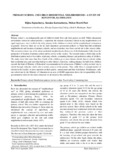Please use this identifier to cite or link to this item:
https://elibrary.khec.edu.np:8080/handle/123456789/186Full metadata record
| DC Field | Value | Language |
|---|---|---|
| dc.contributor.author | Bajracharya, Rijina | - |
| dc.contributor.author | Karmacharya, Sunaina | - |
| dc.contributor.author | Pant, Mohan Moorti | - |
| dc.date.accessioned | 2022-05-02T11:42:38Z | - |
| dc.date.available | 2022-05-02T11:42:38Z | - |
| dc.date.issued | 2020-09 | - |
| dc.identifier.issn | 2091—1475 (Print) | - |
| dc.identifier.issn | 2645-8518 (Online) | - |
| dc.identifier.uri | https://doi.org/10.3126/jsce.v8i0.32857 | - |
| dc.description.abstract | Primary school is an indispensable part of children’s daily lives and their parents as well. While educational environment within the school premise is important, the location of primary schools in any neighborhood is of equal importance, since it affects the daily journey of the children to school and the neighborhood environment in general. However, there are so far no such mandatory government policies in Nepal that link residential neighborhoods and location of primary schools, and no researches have been carried out in this respect either. This research explores one of the urban residential neighborhoods, Koteswor, of the Kathmandu Valley from the perspective of location of primary school and its service to the locality. The research makes a field study on the distribution pattern and service radius of primary schools, commuting distance and pedestrian safety of children. The study shows that more than three fourth of the children go to more distant schools than to schools within their residential area, and more than half go to other districts. Likewise, walking distance for half of the children exceeds the limit of Ministry of Education’s recommendation for urban areas. Children’s safety on their way to school through vehicular road is also a serious concern of the parents. Thus, while there is enough number of schools in the locality, it raises question on their quality, management and their distribution. Furthermore, only one school run by the Ministry of Education in an area of 40,000 population shows the irresponsibility of the government to meet the free basic education for all stated by the constitution. | en_US |
| dc.language.iso | en | en_US |
| dc.subject | Primary school, Distribution pattern, Service radius, Travel safety, Commuting time | en_US |
| dc.title | PRIMARY SCHOOL AND URBAN RESIDENTIAL NEIGHBORHOOD - A STUDY OF KOTESWOR, KATHMANDU | en_US |
| Appears in Collections: | Journal of Science and Engineering Vol.8 | |
Files in This Item:
| File | Description | Size | Format | |
|---|---|---|---|---|
| 1_Rijina_Bajracharya.pdf | 539.16 kB | Adobe PDF |  View/Open |
Items in DSpace are protected by copyright, with all rights reserved, unless otherwise indicated.
